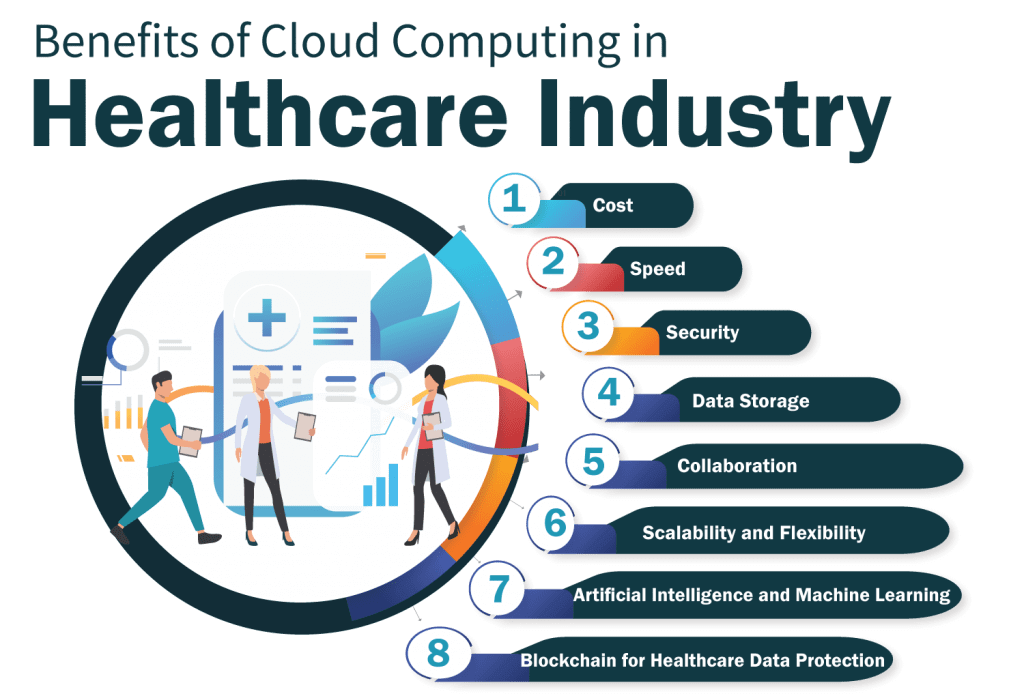Top 8 Benefits of Cloud Computing in Healthcare
Do you know that cloud computing in healthcare markets is estimated to value USD 83.93 billion by 2029?It is currently at USD 49.14 billion. This shows that cloud computing in the healthcare industry has grown at an insane rate over the years.
As a leading virtual doctor software solutions provider, cloud computing forms the core of our technology stack. We have helped providers of all categories, from clinics, and enterprises, to healthcare startups, leverage the benefits of cloud computing.
Our telemedicine platform for providers (clinics and hospitals) is web-based and has a cloud-based EMR. Your clinical and patient data is gathered, stored, retrieved, and managed in a secure manner that aligns with HIPAA, GDPR, and other region-specific guidelines.
Table of Contents
- What is Cloud Computing in Healthcare?
- Benefits of Cloud Computing in the Healthcare Industry
- Conclusion
- FAQ’s
What is Cloud Computing in Healthcare?
Today, clouds are well-established and ubiquitous tools, and switching to the cloud has a double benefit. This has proven to be beneficial for both healthcare providers and patients. On the enterprise side, cloud computing has proven to reduce operating costs while enabling providers to provide quality and personalized maintenance.
Storing, managing, and processing healthcare-related data with the help of using remote servers via the internet is cloud computing in healthcare. Patients who are accustomed to providing services immediately will receive the same emergency care from the healthcare sector. The cloud also strengthens patients’ involvement in their health plans, giving them access to their healthcare data, resulting in better patient outcomes.
Healthcare organizations in the US have adopted cloud-based healthcare solutions designed to store and protect patient data after introducing the Electronic Medical Records (EMR) mandate.
In an industry that produces significant data daily, democratizing this information and ensuring access is crucial. So to get the answer, let us go through the benefits of cloud computing in healthcare.
Benefits of Cloud Computing in the Healthcare Industry
Cloud computing has transformed the entire healthcare domain and has provided the best benefits to this industry. It would not be wrong to say that healthcare professionals are turning towards cloud computing for all its benefits. To understand the benefits, let’s read on.

1. Collaboration
Sharing makes collaboration easier. With cloud computing, the data-sharing process has become much simpler. As healthcare organizations move toward value-based payment methods, collaboration between people is essential. Also, keep in mind, healthcare information must remain confidential.
With the help of the cloud, medical service providers can transfer data to each other, enhancing collaboration for better care. The cloud in healthcare can be used to securely share data in real time between doctors, nurses, and caregivers.
In addition to sharing, they have access to medical reports and documents anytime, anywhere. The cloud has also facilitated remote conferencing, rapid updating of healthcare developments, and patient status, making it an ideal companion for healthcare professionals.
2. Security
When discussing the cloud, one of the most common problems is how secure all your applications and patient data are stored on a third-party server. The reason being so concerned is that the healthcare data must remain confidential. Cloud security in healthcare networks provides security because it has unique security features that can alert you to suspicious attempts. Also, even if there is a data breach, healthcare providers do not lose any data and can minimize downtime for their staff using cloud computing.
3. Cost
Clouds hold a tremendous amount of information at a very minimal cost. Cloud computing gives the leverage to choose from their subscription model. With the help of this subscription model, healthcare providers can save money by purchasing the model according to their requirements. The healthcare industry can use the resources provided by cloud providers with the help of cloud servers.
4. Speed
Speed is an important criterion before choosing any technology. Cloud-based tools update their features consistently with minimal intervention, and there will be real-time updates on all relevant information. The unbeatable speed and faster access to information provided by cloud computing healthcare help overcome the stumbling blocks faced by the cloud healthcare industry.
5. Scalability and Flexibility
The cloud facilitates healthcare technologies such as electronic medical records, mobile applications, IoT devices, etc. It offers worry-free scalability and flexibility, which in turn improves the final decision-making process.
With the help applications of Cloud computing, healthcare providers can increase or decrease their data storage according to the flow of patients. Also, a cloud migration strategy reduces risks and minimizes downtime, prevents information leakage, improves data processing, and strengthens security practices.
6. Artificial Intelligence and Machine Learning
AI and machine learning opportunities can be a crucial solution during this crisis that can support clinical decisions and faster treatment times. Not only during COVID, but this combination will serve the healthcare industry for its betterment.
Healthcare cloud platforms are integrating AI and ML into their services. Simultaneously, cloud computing can support the transition of artificial intelligence to traditional healthcare and help users manage vast amounts of data.
7. Data Storage
Healthcare providers manage all sorts of data, resulting in a lot of data, and not all internal devices can store it. With the help of cloud computing, the healthcare industry can avoid the extra cost of maintaining physical servers and can store huge amounts of data.
8. Blockchain for Healthcare Data Protection
Implementing a blockchain in the healthcare IT infrastructure can help achieve greater data security and ensure the pharmaceutical supply chain and health research integrity. Blockchain has become an indispensable healthcare tool by tracking medications, improving payment options, and decentralizing patient health history data.
Blockchain systems can help reduce breaches during data exchange and give patients more responsibility for their data and records. This technology benefits the healthcare industry in many ways, including robust monitoring, and transparent and organized complex processes.
Discover the power of our cloud-based telemedicine platform. Connect with experts now!
Conclusion
Now that you know the many benefits of cloud technology in healthcare, it’s time to bring the cloud advantage to your practice. Whether you a small clinic or a growing enterprise, we have a complete lineup of cloud-based products that are easy to set up and use.
Our healthcare business cloud solutions include:
- Telemedicine platform for doctors
- Telemedicine platform for clinics
- Telemedicine platform for hospitals
- Telemedicine platform for startups
And, in case you are not a patient-facing healthcare business, but handle patient health information in one way or another. We have you covered on that front as well with a comprehensive range of data compliance and integration services, such as:
- NABIDH compliance for UAE
- GDPR compliance for Europe
- HIAA compliance for North America
- And more.
So whether data compliance, remote healthcare, or cloud computing benefits– VCDoctor is a one-stop place for all your healthcare IT needs. Feel free to reach out to us for more details. more insights on our cloud computing in healthcare industry services!
FAQ’s
1. Which cloud hosting solutions do you recommend to healthcare businesses?
We recommend robust solutions like AWS, Azure, and Google Cloud for healthcare businesses due to their security, scalability, and compliance features.
2. Can you help me choose the right cloud solution provider?
Our experts can guide you in selecting the right cloud solution provider tailored to your healthcare business needs and requirements.
3. Can help move my legacy software to the cloud?
Yes, our team specializes in the seamless migration of legacy software to the cloud, ensuring minimal disruptions and enhanced efficiency.
4. Can you offer me an estimate for cloud migration?
Certainly, we can provide you with a customized estimate for cloud migration based on your specific requirements. Let’s discuss the details!
5. Can I get a demo of your cloud-based telemedicine platform?
Of course! Our team will walk you through everything in detail. Contact us to schedule a demonstration




